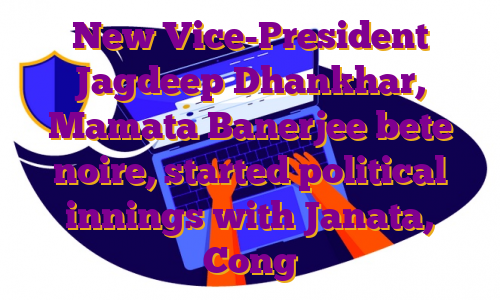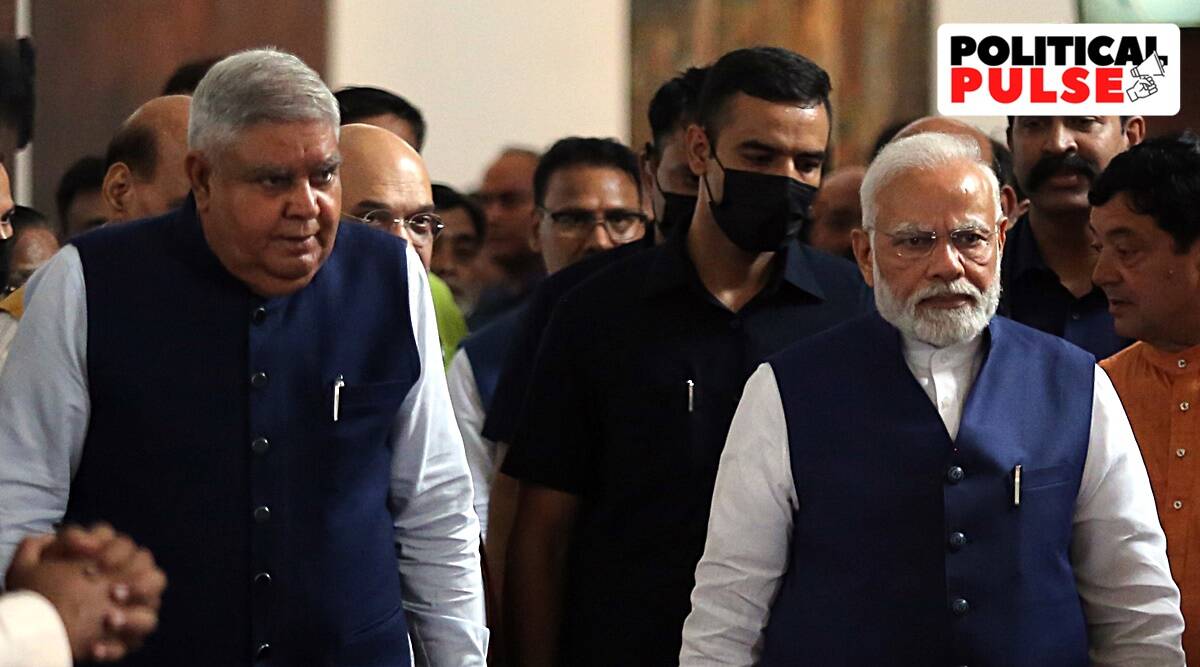Since July 2019, when he was appointed by the BJP-ruled Centre as the Bengal Governor, Dhankhar had been at loggerheads with the Mamata Banerjee-led Trinamool Congress (TMC) government on a range of issues.
For a leader known more for his run-ins with the Banerjee government as the Governor, and whom the TMC had often accused of acting as an “agent of BJP”, the first election Dhankhar contested was on a Janata Dal ticket, when he was elected to the Lok Sabha from Rajasthan’s Jhunjhunu in 1989.
His next election was for the Rajasthan Assembly — this time on a Congress ticket. Having represented the Kishangarh Assembly constituency from 1993 to 1998, Dhankhar, a graduate from University of Rajasthan, Jaipur, who completed his LLB degree in 1978-79, is also a former president of the Rajasthan High Court Bar Association.
“From 1998, he was a full-time senior advocate practising in Supreme Court — until he was appointed the Governor of West Bengal in 2019,” says his younger brother Randeep Dhankhar.
After he joined the BJP, Dhankhar, a Jat leader, became the national convener of the saffron party’s law and legal affairs department in 2016. BJP sources said he had in the past “extended solid support both politically and through legal advice and assistance” to the BJP, RSS and its affiliates.
Born into a farmer’s family at Kithana village in Jhunjhunu district in 1951, Dhankhar studied at a local government school before going to Sainik school in Chittorgarh. He is married to Sudesh Dhankhar and they have a daughter, Kamna.
Since his appointment to the Kolkata Raj Bhavan, Dhankhar had been virtually a one-man opposition in Bengal, having taken on the TMC government regularly over various issues. In fact, such acrimonious had been the relationship that CM Banerjee had even blocked Dhankhar on social media.
From law and order situation in the state to post-poll violence, and from corruption charges to lapses in bureaucracy, Governor Dhankhar was never short of issues to criticise the TMC government.
His relation with Bengal Assembly Speaker Biman Banerjee was no less bitter. Last year, Biman Banerjee complained to the then President Ram Nath Kovind against Dhankhar for allegedly interfering in matters of the state government. Dhankhar, in turn, criticised the Speaker for stopping video coverage of his speech in the Bengal Assembly, and even closing the House gates on one occasion to deny him entry.
The relation between Dhankhar and the Mamata Banerjee government took a turn for the worse when the latter decided to replace the Governor with the CM as the Chancellor of the state universities. The Assembly passed The West Bengal University Laws (Amendment) Bill, 2022, on June 13. A day later, The West Bengal Private University Laws (Amendment) Bill, 2022 was passed — to appoint the state education minister as Visitor of private universities in the state. Both Bills have still been pending with the Raj Bhavan for approval.
While the TMC had accused Dhankhar of not clearing various Bills and creating “unnecessary hurdles” in the functioning of the state government, the latter claimed he had gone by the book and the Constitution in pointing out issues to the government and the state legislature. Dhankhar had often sought details, especially details of expenditure, from the state government on various issues.
Interestingly, the TMC leadership had remained tight-lipped for five days over Dhankhar’s Vice-Presidential candidature which was announced by BJP president J P Nadda on July 16. Finally, on July 21, TMC supremo Banerjee held a meeting of the party’s national working committee to discuss the issue, which decided that their MPs will abstain from voting in the August 6 Vice-Presidential election.
After this meeting, TMC national general secretary Abhishek Banerjee had said, “There is no question of giving our support to the NDA candidate. But it has been decided that we will abstain from the Vice-Presidential election. This is because we disagree with the process of announcing the Opposition candidate without taking us into confidence. We were neither consulted nor was anything discussed with us. Therefore, we can’t support the Opposition nominee.”
The TMC’s decision, however, left many baffled given the protracted bad blood between the party leadership and Governor Dhankhar.
According to the Raj Bhavan website, Dhankhar is an avid reader, a sports aficionado — he has been president of the Rajasthan Olympic Association and Rajasthan Tennis Association — and loves travelling with his family.
In 1989, the then Haryana CM Chaudhary Devi Lal had vigorously campaigned for Dhankhar when the Janata Dal had fielded him in the parliamentary polls from Jhunjhunu.
Ranjit Singh Chautala – Devi Lal’s son and a minister in Haryana’s Manohar Lal Khattar-led government – told The Indian Express: “Dhankhar is like a member of our family. He came into politics after being influenced by Devi Lal.”
Ranjit Chautala said: “In 1987, Chaudhary Devi Lal had called for a rally of the Opposition at Boat Club in Delhi. Dhankhar brought as many as 500 vehicles full of people from Jhunjhunu to participate in the rally. Devi Lal patted him on the back. Devi Lal called him from his home and offered a ticket of Janata Dal to contest from Jhunjhunu Lok Sabha constituency in 1989.” Dhankhar won the election and became minister of state (parliamentary affairs) in the V P Singh-led government when Devi Lal became Deputy Prime Minister.
Ranjit Chautala recalled that “Following differences, PM V P Singh had dismissed Devi Lal in 1990. Then, Dhankhar was the only minister who resigned from the Union Cabinet standing by Devi Lal. It impressed Devi Lal who called Dhankhar a man of commitment.” Later, Devi Lal became Deputy PM in the minority government led by Chandrashekhar while Dhankhar also became a minister in his government.
.


